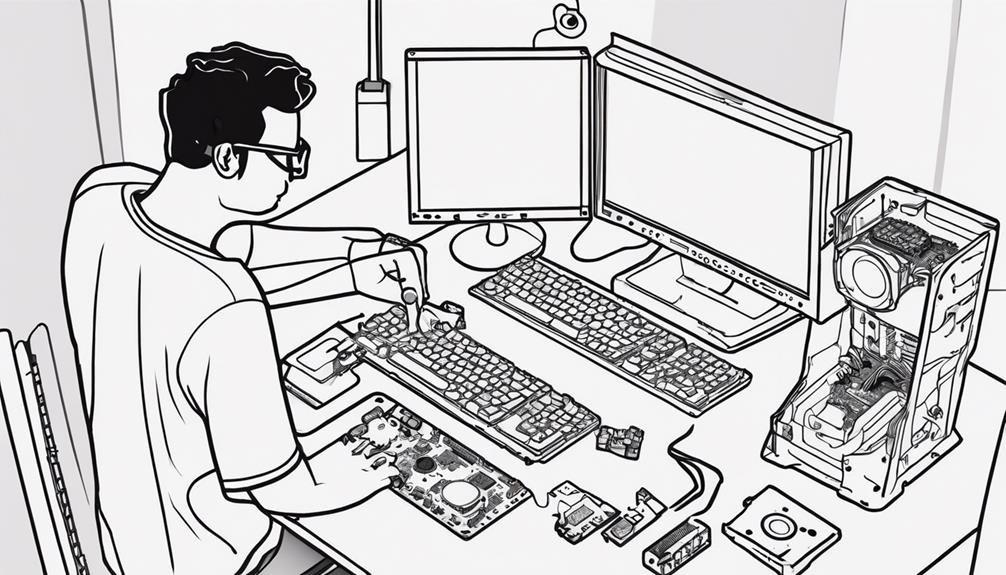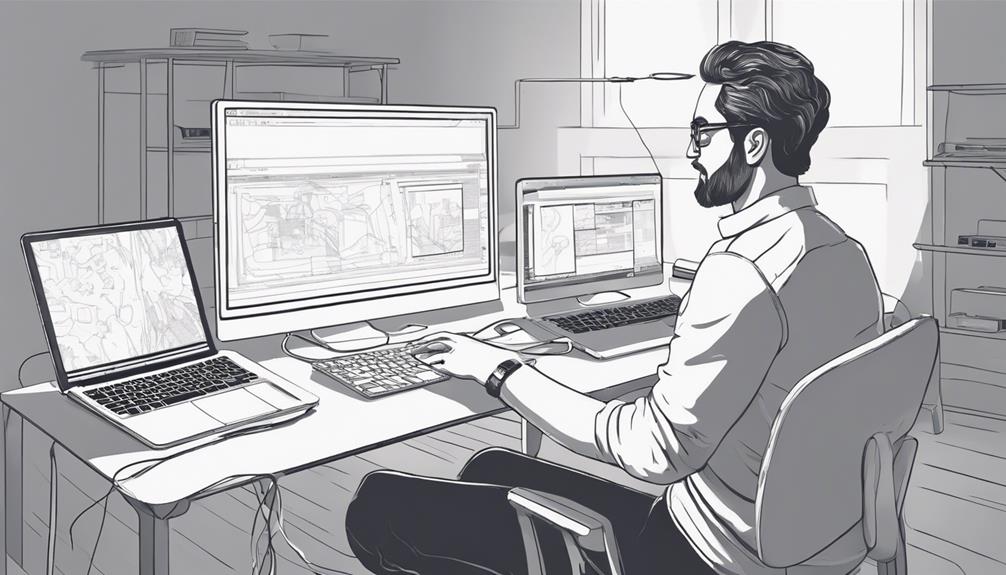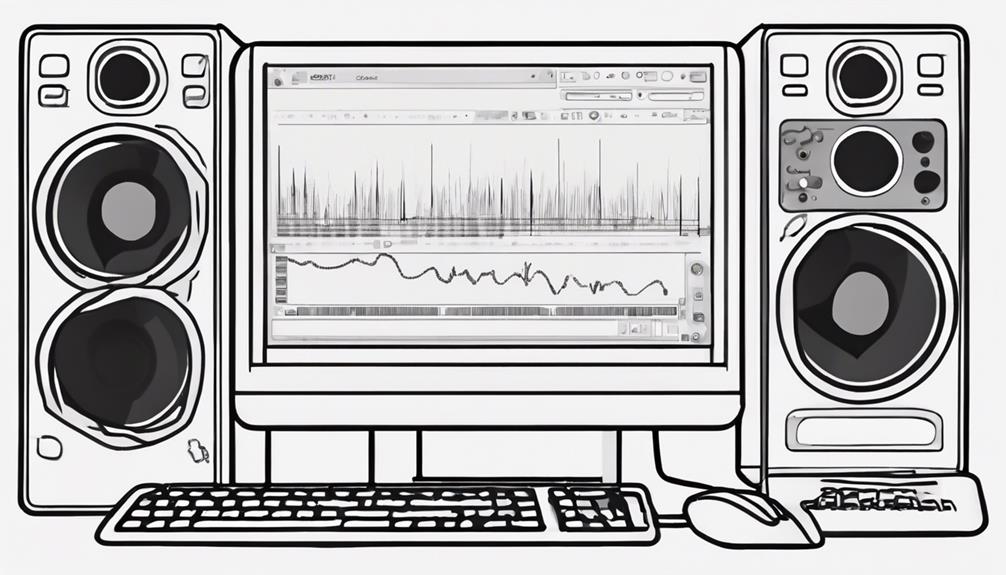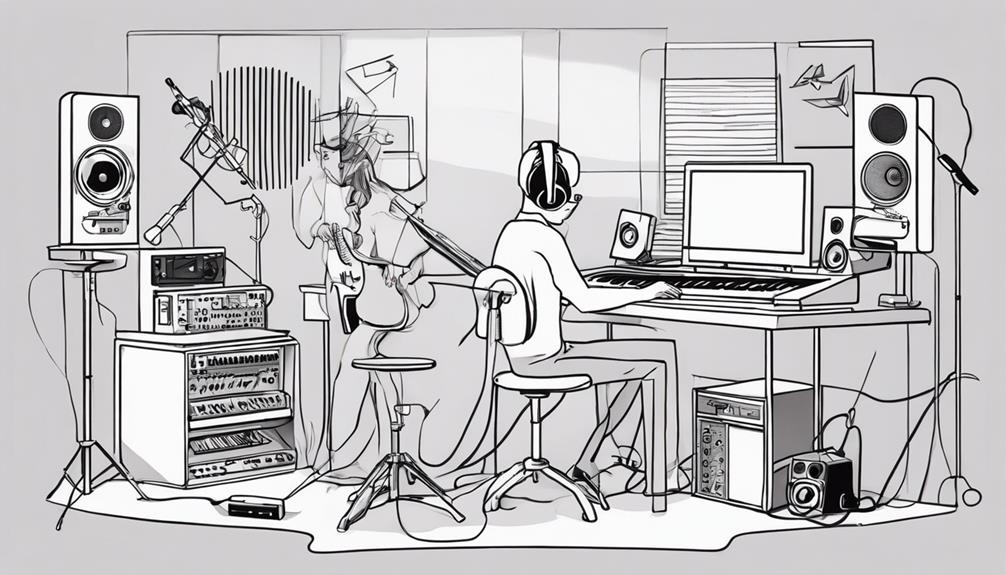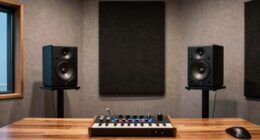To build a PC for music production, select a powerful CPU like Ryzen 9 5900X. Choose a mid-range GPU such as NVIDIA GTX 1660 for performance. Opt for at least 16GB DDR4-3200 RAM. Install a 500GB NVMe SSD for speed. Get a compatible motherboard with ample slots. USB audio, DACs, and amplifiers enhance performance. Use software like Pro Tools for editing. Assemble components following the motherboard manual. Complete with cables from the power supply. Verify tight connections and airflow.
Key Takeaways
- Select CPU with high core count for performance.
- Choose mid-range GPU like NVIDIA GTX 1660.
- Opt for at least 16GB DDR4 RAM.
- Include NVMe SSD for fast storage.
- Verify motherboard compatibility and features.
Selecting the Right CPU
When building your own PC for music production, selecting the right CPU is essential for top performance. For tasks like heavy audio processing, having a CPU with a higher core count, such as the Ryzen 9 5900X, can greatly enhance your workflow. The number of CPU cores directly impacts the CPU processing power, allowing for smoother handling of complex music production tasks.
It's important to take into account the impact of integrated graphics on CPU performance. CPUs like the Ryzen 7 7700X provide integrated graphics that can influence overall processing capabilities. Depending on your specific music production needs, you may need to assess CPUs like the Ryzen 9 5900X or even opt for a Xeon processor with more threads for intensive audio workloads.
When choosing a CPU, be mindful of the trade-offs between integrated and dedicated GPUs. While integrated graphics can save costs and space, dedicated GPUs offer superior performance for graphics-intensive applications. Make an informed decision based on your priorities when selecting a CPU for your music production PC.
Choosing Graphics Card for Performance
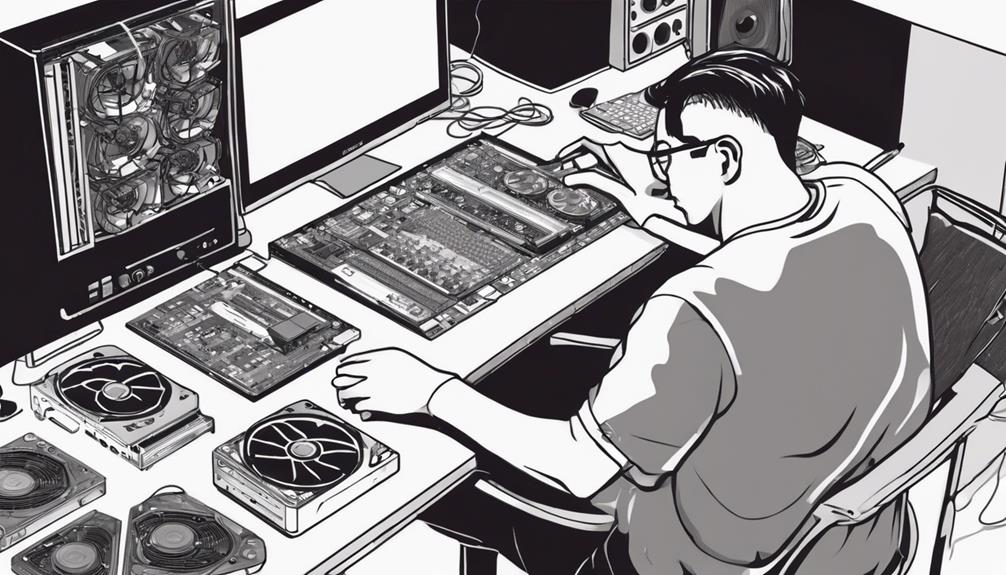
Selecting a suitable graphics card is essential for optimizing performance in your music production PC. When choosing a graphics card for music production, consider these key factors:
- Opt for Mid-Range Cards: Look into options like the NVIDIA GTX 1660 or AMD RX 5600 for a good balance between performance and cost-effectiveness in handling visual plugins and audio visualization tasks.
- Check VRAM Capacity: Higher VRAM capacity on the graphics card enables smoother handling of textures and effects within audio software, enhancing overall performance.
- Ensure Compatibility: Verify that the graphics card is compatible with your motherboard and power supply to prevent any hardware conflicts or power-related issues that could hinder performance.
- Consider Upgrading: If you require more power for demanding audio software and visual effects, upgrading to a higher-end GPU like the NVIDIA RTX 3060 Ti can greatly boost your music production performance.
Optimal RAM Configuration
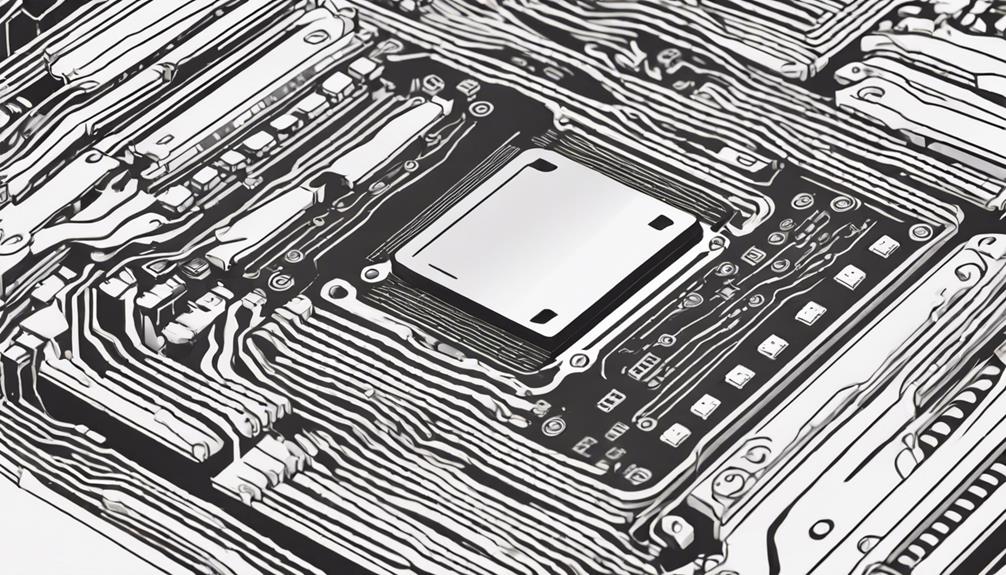
To enhance your music production setup further, understanding the ideal RAM configuration is essential for efficient handling of multiple tracks and plugins. When building a custom music production PC, your RAM choice plays a significant role in meeting your music production needs. Opt for at least 16GB of RAM to ensure smooth operation with multiple tracks and plugins. For larger projects with extensive virtual instruments and effects, consider 32GB or more for optimal performance. Higher RAM speeds like DDR4-3200 or DDR5-4800 can further enhance your system's capabilities in audio processing tasks. Utilizing a dual-channel RAM configuration improves memory bandwidth, allowing for smoother multitasking capabilities during music production sessions. Ensure compatibility with your motherboard and CPU to maximize performance and avoid any potential bottlenecks in your workflow.
| RAM Capacity | Ideal for | Speed | Configuration | Compatibility |
|---|---|---|---|---|
| 16GB | Multiple tracks and plugins | DDR4-3200 | Dual-channel | Check motherboard |
| 32GB+ | Larger projects with many effects | DDR5-4800 | Dual-channel | Verify with CPU |
Storage Solutions for Speed
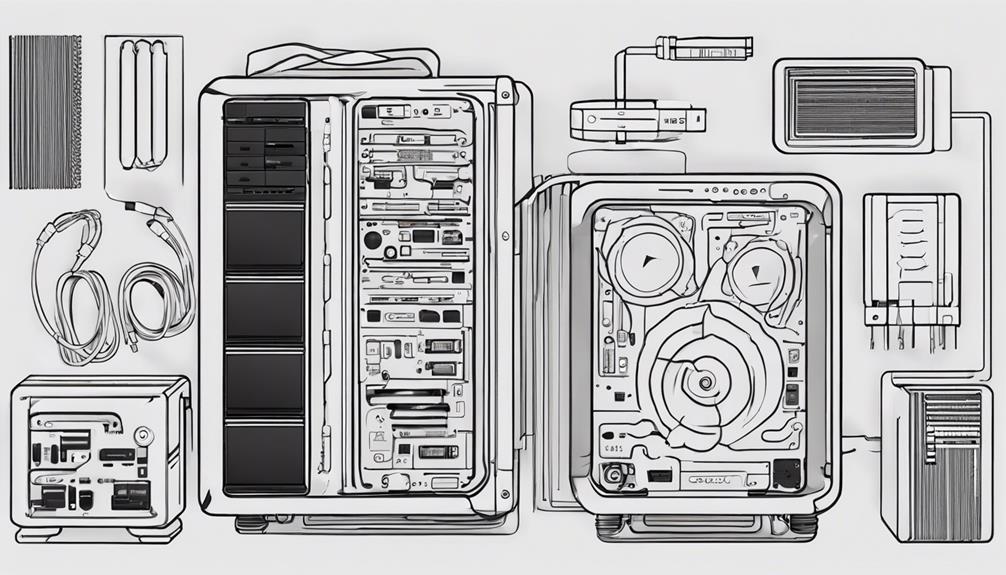
For faster data transfer speeds and seamless audio production workflows, consider incorporating NVMe SSDs as your storage solution. NVMe SSDs offer quicker data transfer rates compared to traditional SATA SSDs, making them ideal for swift access to audio files and samples.
M.2 NVMe SSDs, specifically, provide high-speed storage solutions tailored for uninterrupted audio project workflows. To guarantee peak performance, aim for a minimum of a 500GB NVMe SSD to store your audio projects and software efficiently.
Additionally, exploring RAID configurations can enhance both redundancy and overall storage performance. If you require even faster data speeds for demanding music production tasks, consider SSDs with PCIe 4.0 support.
Motherboard Considerations
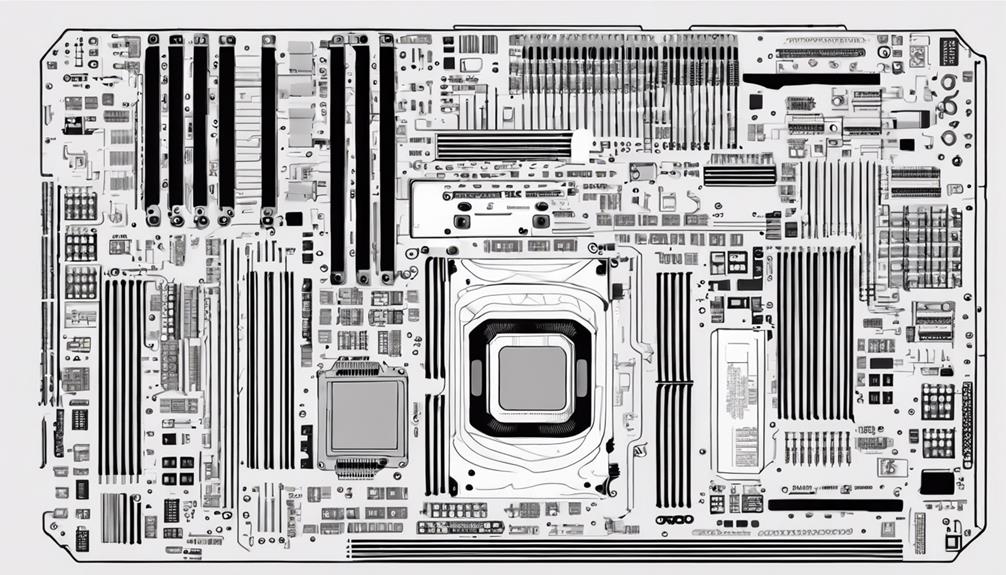
When choosing a motherboard for your music production PC, it's essential to verify compatibility with your components and peripherals. Seek out ample PCIe slots for sound cards and interfaces. Look for high-quality audio components that can enhance sound output. Built-in Wi-Fi is also important for seamless connectivity. Additionally, opt for a motherboard with enough RAM slots. This will allow for future upgrades and help keep your system running smoothly.
Compatibility With Components
Confirm that your chosen motherboard is compatible with the components you plan to use for your music production PC, starting with the appropriate socket type for your CPU.
Here are some key considerations to guarantee compatibility:
- Motherboard Socket Compatibility: Verify that the motherboard supports the socket type of your chosen CPU.
- Chipset Compatibility: Check if the motherboard's chipset is suitable for your RAM and storage devices.
- PCIe Slots and USB Ports: Take into account the number of PCIe slots and USB ports for your expansion needs.
- Motherboard Features and Form Factor: Look for onboard audio, networking capabilities, and ensure the motherboard's form factor fits your chosen PC case.
Ports and Connections
Check the various ports and connections available on your chosen motherboard to guarantee seamless integration with your audio equipment and peripherals.
When selecting a motherboard for your music production PC, consider the inclusion of USB 3.2 Gen 2 and USB-C ports. These ports offer high-speed data transfer and compatibility with modern peripherals such as audio interfaces, MIDI controllers, and external gear.
Additionally, optical audio ports can provide a digital optical connection to audio equipment, guaranteeing high-quality audio transmission.
Look for HDMI and DisplayPort connections on the motherboard, which can be useful for connecting to external monitors or audio interfaces for a more versatile setup.
It's crucial to make sure that the motherboard has an adequate number of PCIe slots for expansion cards, such as sound cards or additional audio interfaces, allowing you to customize your setup based on your specific music production needs.
Power Supply Essentials
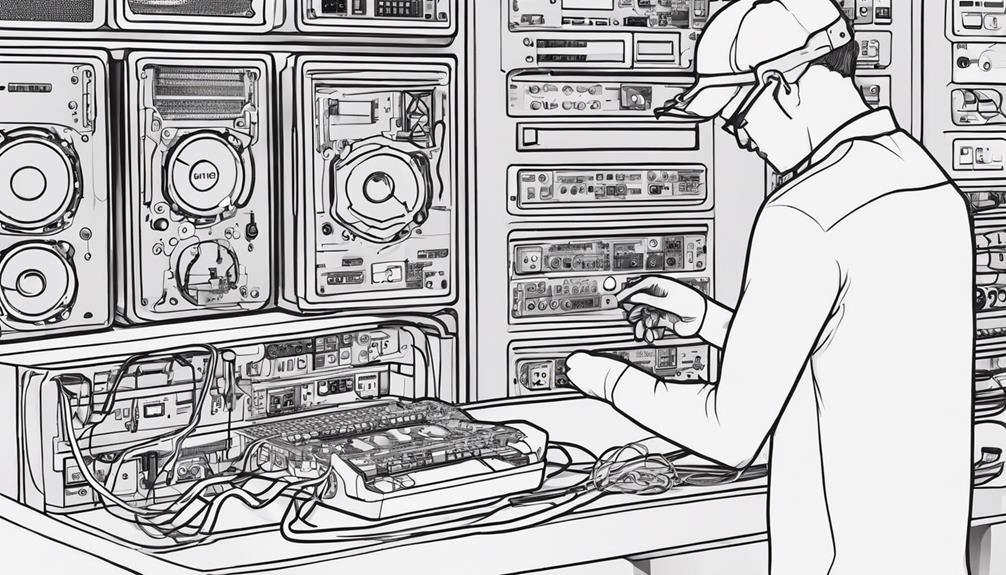
Consider selecting a power supply unit (PSU) that meets the wattage requirements of your components when building your own PC for music production. To guarantee peak performance and longevity of your system, pay attention to the following essentials:
- Wattage: Choose a PSU with sufficient wattage to power all your components effectively.
- Efficiency Ratings: Look for high efficiency ratings like 80 Plus Bronze to reduce energy waste and heat output.
- Modular PSUs: Opt for modular PSUs for easier cable management, improved airflow within your case, and a cleaner build overall.
- Connectors and Warranty: Ensure the PSU has the necessary connectors for your motherboard, CPU, GPU, and storage devices. Additionally, consider the warranty offered by the manufacturer for long-term reliability.
Peripherals for Music Production
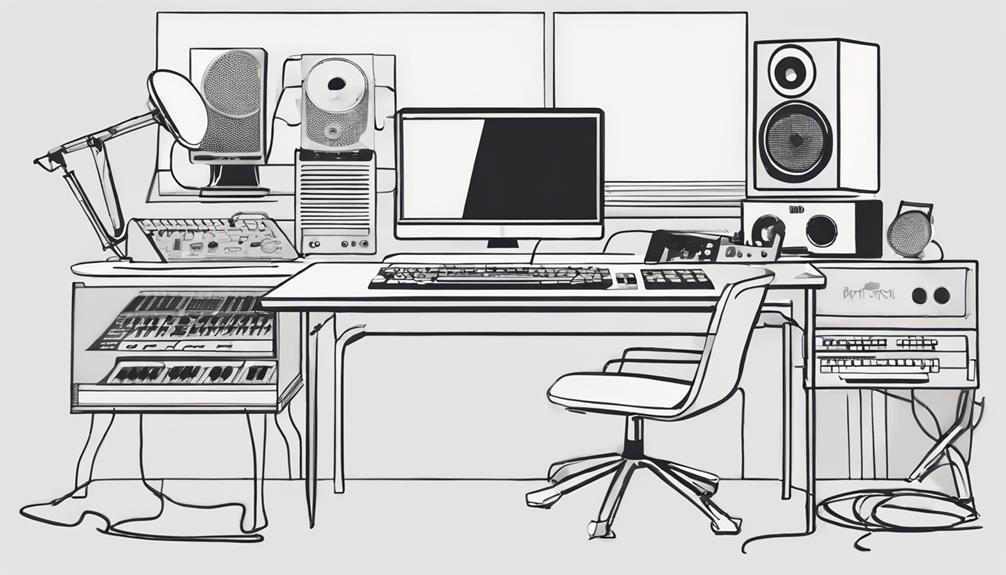
When setting up your music production workstation, outfitting it with the right peripherals is key for achieving professional audio quality and efficient workflow. Essential peripherals like sound cards, DACs, and USB interfaces play a crucial role in providing high-quality audio inputs and outputs. Selecting the right microphone is vital for capturing clear and professional audio during recording sessions. Quality headphones and speakers are necessary for accurate sound reproduction and monitoring. Additionally, investing in specialized peripherals such as MIDI controllers can enhance creativity and streamline workflow efficiency in music production. External DACs and amplifiers can also be valuable additions to your setup, improving overall audio quality.
| Peripherals | Description |
|---|---|
| USB Audio | Provides high-quality audio through USB connection |
| DACs | Enhance audio quality and clarity |
| Amplifiers | Boost audio signals for better sound output |
Software for Audio Editing
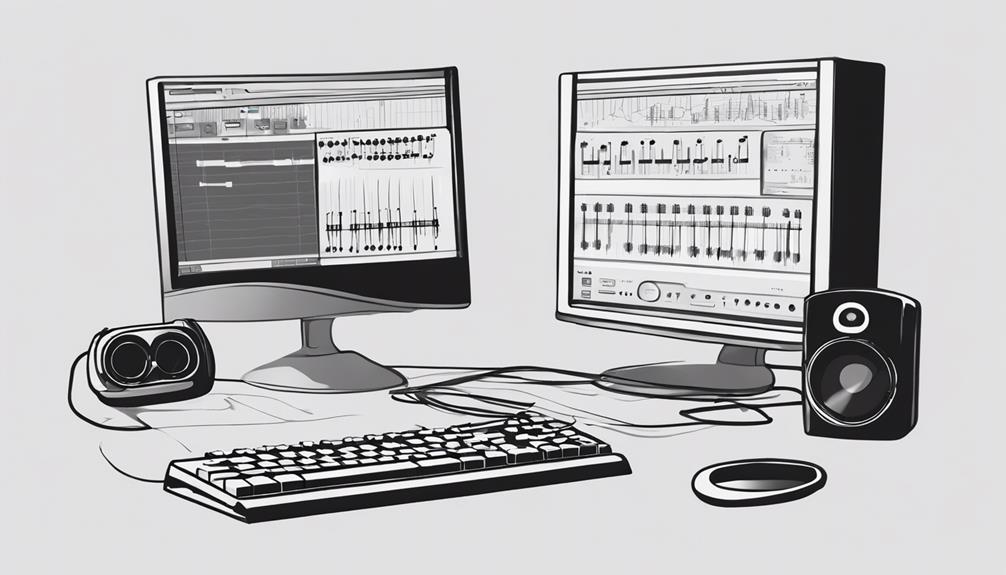
Exploring various digital audio workstations (DAWs) can provide you with a versatile array of tools for audio editing and music production. Here's what to keep in mind:
- DAWs Selection: Choose popular software like Ableton Live, Pro Tools, or FL Studio for extensive audio editing capabilities.
- Plugins and Virtual Instruments: Enhance your creativity by incorporating plugins and virtual instruments into your chosen DAW for a personalized sound production experience.
- Mixing and Mastering Tools: Utilize built-in tools within DAWs to achieve professional-level audio quality and ensure a balanced mix for your music productions.
- Audio Restoration and Real-Time Effects: Employ software like iZotope RX for audio restoration to clean up recordings, and utilize real-time effects within DAWs for live performances and recording enhancements.
Building and Assembling the PC
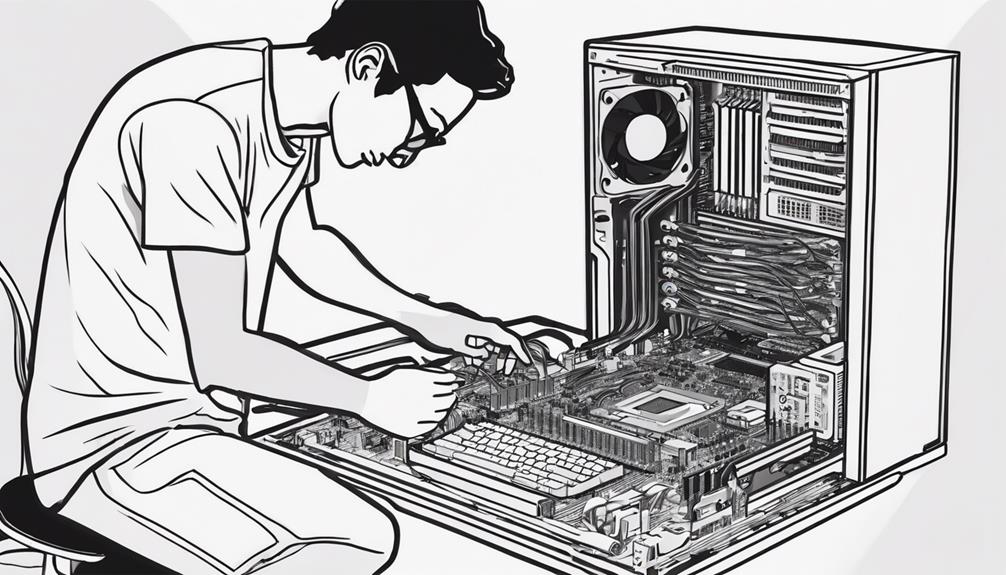
Gather all the necessary components such as CPU, GPU, RAM, motherboard, storage, and power supply before beginning the assembly process. To guarantee a smooth building experience, have the right tools like screwdrivers, anti-static wrist straps, and thermal paste on hand.
Follow the motherboard manual meticulously to correctly install the CPU, RAM, GPU, and other components into their designated slots on the motherboard.
Connect all cables from the power supply to the motherboard, GPU, storage devices, and other components to provide power to the system. It's essential to double-check all connections, tighten screws, and ensure proper airflow in the case before powering on the PC for the first time.
Taking these steps will help prevent any issues and make certain that your PC is ready for music production tasks.
Building your own PC for audio production can be a rewarding experience, providing you with a customized and powerful tool for your music endeavors. It allows you to select each component tailored specifically to your needs, ensuring optimal performance for running demanding digital audio workstations (DAWs) and plugins. When you build a music production PC, you can prioritize high-speed processors, ample RAM, and efficient storage solutions to handle large audio files seamlessly. Additionally, this approach often provides better value for your investment compared to pre-built options, giving you greater control over upgrades and future expandability.
Frequently Asked Questions
Is DIY PC Cheaper?
Yes, DIY PC building can be cheaper. When you research and choose cost-effective components tailored to your needs and budget, you save money on markup costs. It's a smart way to optimize performance and value.
How to Configure PC for Music Production?
To configure your PC for music production, go for high-quality core counts and clock speeds for crazy fast performance. Load up on RAM for handling big files and plugins. SSD storage is a must for smooth workflow. Get a premium sound card for quality audio. Cool it well for intense sessions.
Can a Gaming PC Be Used for Music Production?
Yes, a gaming PC can be used for music production. Make sure it has a powerful CPU, ample RAM, and fast storage. Integrated graphics are sufficient. Customize it with components optimized for music production, like a high-core CPU and low-latency USB chipset.
What Is the Minimum Processor for Music Production?
For music production, you'll want a processor with at least 4 cores for efficient multitasking. Consider Intel Core i5 or AMD Ryzen 5 CPUs. Look for high clock speeds, multi-threading, and good single-core performance.
Conclusion
As you finish assembling your DIY music production PC, each component coming together symbolizes the harmony and creativity you'll be able to achieve with your new setup.
Get ready to tap into your musical genius with a custom-built machine that's tailored to your specific needs.
The possibilities are endless when you have the right tools at your fingertips.
Happy creating!

